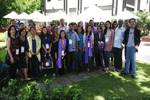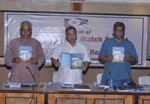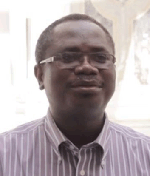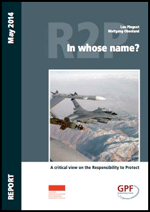Social Watch news
Published on Fri, 2014-05-30 09:33
Civil society groups from Asia and the Pacific met in Bangkok from May 15-17, 2014 to develop regional recommendations on just and sustainable development for action at the Asia Pacific Forum on Sustainable Development. The Asia Pacific region has seen rapid growth, and significant improvements in the lives of millions of people over the last decades but grave challenges remain. The region still has the largest concentration of people without adequate food, income and employment. Inequalities in the distribution of wealth, power and resources between and within countries, and among rich and poor, men and women, social groups, and current and future generations, are growing and undermining wellbeing for the majority of the population. |
Published on Thu, 2014-05-29 15:00
On Tuesday the 27th of May 2014, Mirjam van Reisen was interviewed by the Dutch newspaper the ‘Volkskrant’ concerning the human trafficking of Eritrean refugees. She explains that those in power in Eritrea richly profit from the human trafficking and even find ways to extort money from Eritrean refugees in Europe via taxation. In addition, it is likely that Eritrea also profits from the extortion of Eritrean families in Europe who pay human traffickers money in order to save their kidnapped relative. An incredible amount of money circulates within these human trafficking practices and estimations surpass 600 million Euro’s in the last 5 years alone. In order to protect Eritrean refugees and in the attempt to stop these criminal practices, Mirjam van Reisen advises to close all Eritrean embassies in Europe, to better secure refugee camps where refugees are kidnapped from, and to cooperate with refugees to reveal and capture those responsible for these criminal practices. |
Published on Thu, 2014-05-29 13:46
Every year the World Bank issues its Doing Business Report, which contains a ranking of each country’s business environment. In 2012, the President of the World Bank, Dr. Jim Yong Kim, appointed an Independent Panel of experts to review the report. The panel, chaired by South Africa’s Minister of Planning Mr. Trevor Manuel, appeared to be an opportunity to change the report for the better. The Panel, indeed, came up with substantive recommendations for an overhaul of the Doing Business. But most of them have been ignored. Those who understand the power of this report and its associated rankings to drive governments and give them the cover to put the interest of private companies ahead of the rights of working people and their families may win again if we don’t speak up. |
Published on Thu, 2014-05-22 11:00
With two more sessions left to go, work at the United Nations on the Sustainable Development Goals (SDGs) faces continuing challenges. On Friday 9 May, the Co-Chairs of the Open Working Group (OWG) on Sustainable Development Goals (SDGs) produced a narrative ‘chapeau' of two pages that will accompany the framework of the goals, sent to all Member States. The 11th session of the OWG took place on 5-9 May at the UN headquarters in New York. The Co-Chairs are Ambassadors Macharia Kamau of Kenya and Csaba Korosi of Hungary. Since the OWG started holding intergovernmental discussions in March 2013, developing countries in the Group of 77 and China (G77) have consistently called for a narrative to accompany the SDG framework. |
Published on Thu, 2014-05-15 19:24
The National Social Watch Report and the Odisha Social Watch Report 2013 was launched on Tuesday 13th May 2014 in DRTC-CYSD, Bhubaneswar, India. Mr. Jagadananda, President of National Social Watch, presented both the reports, followed by the presentations of the findings of the reports and open discussions. Dowload the Citizens' Report on Governance and Development 2013 and Odisha Social Watch Report 2013. » |
Published on Thu, 2014-05-15 09:21
The participants in the civil society strategy meeting on monitoring and accountability organized by Social Watch last february in Montevideo were asked about how they personally work and relate with the huge task of making the powerful accountable. Here is what they said: |
Published on Wed, 2014-05-14 14:17
Social Watch El Salvador has been executing a project called “Awareness and advocacy as tools for the financial education of the Salvadoran population and demanding a fair legislative framework for financial products.” The project has the objective of contributing to the generation of public opinion on abuses perpetrated by financial institutions that have an impact on the population generating negative impacts on poverty and human rights conditions. |
Published on Sat, 2014-05-10 17:35
"In whose name? A critical view on the Responsibility to Protect (R2P)” provides an overview of the history and content of R2P, its positive contributions and its flaws. It concludes that R2P does not give a satisfying answer to the key question it is supposed to address: how best to prevent and, if prevention fails, respond to large-scale human rights violations and killings? The concept is particularly dangerous as it amalgamates arguments and proposals, mixing uncontroversial and widely accepted notions (that states have a responsibility towards their citizens) with more dubious claims (that military intervention is an appropriate tool to protect civilians). |
Published on Thu, 2014-05-08 12:53
After a decade of high growth in sub-Saharan Africa, it is time to ask: who benefits? Certainly growth has been accompanied by somepoverty reduction and some progress in health and education. But advances are inadequate compared to the wealth created. Worse still, income inequality is rising in too many countries. A new report by Tax Justice Network-Africa and Christian Aid investigates income inequality in eight sub-Saharan African countries and asks whether their tax systems are working to narrow the gap between rich and poor. The report has many worrying findings. In Nigeria, in 1986 the richest 10 per cent were 1.7 times wealthier than the poorest 40 per cent. By 2010, they were 3 times richer – a 75 per cent increase in the concentration of income. In Zambia, income inequality is now at its highest level since data began to be collected, while South Africa still has one of the highest levels of inequality in the world – and it’s growing. |
Published on Wed, 2014-05-07 00:14
The first High-Level Meeting of the Global Partnership for Effective Development Cooperation took place from 15 to 16 April in Mexico-City. – A commentary on the results by Anne-Sophie Gindroz. This 1st High-level Meeting of the Global Partnership on Effective Development Cooperation was meant to discuss the progress made so far in development co-operation and to anchor the Global Partnership in a post-2015 development framework. From the perspective of civil society organisations (CSO), the mounting evidences of shrinking space for civil society are indicating that no progress were made from Busan in promoting an enabling environment «to maximize CSO contribution to development». |
SUSCRIBE TO OUR NEWSLETTER











